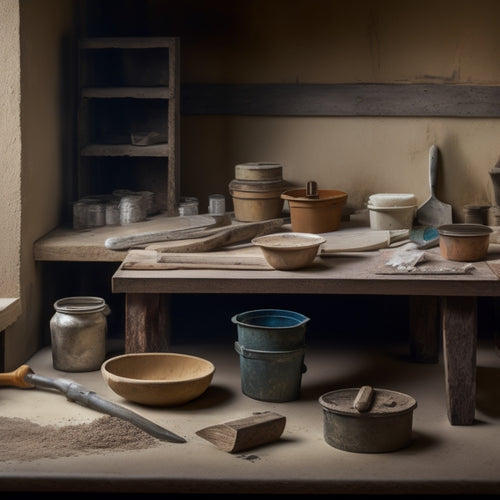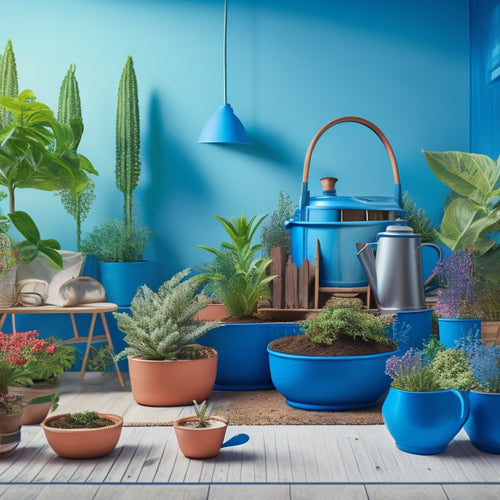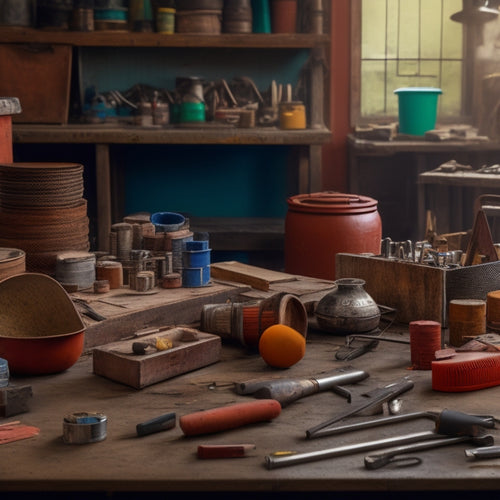
Why Use Concrete Blocks in Home Renovation
Share
You're considering using concrete blocks in your home renovation, and for good reason: they offer a unique combination of structural stability, strength, and durability that makes them an attractive option for building and renovating homes. With their non-combustible properties, they enhance fire safety and provide exceptional thermal insulation, reducing energy costs and carbon footprint. Plus, they're resistant to pests, mold, and mildew, ensuring a healthy living environment. And, with lower material costs, reduced labor expenses, and sustainable building options, they're a cost-effective choice. As you explore the benefits of concrete blocks, you'll discover how they can bring value and functionality to your renovation project.
Key Takeaways
- Concrete blocks provide structural stability, ideal for earthquake and hurricane resistance, and offer exceptional strength and durability for long-lasting use.
- They deliver thermal insulation, reducing energy costs and carbon footprint, while being resistant to pests, mold, and mildew for a healthy living environment.
- Concrete blocks are a cost-effective renovation option, with lower material costs, reduced labor expenses, and sustainable building practices.
- They offer versatility in design options, allowing for unique architectural features, functional structures, and complex structures requiring strength.
- Concrete blocks provide long-term value of investment, with exceptional durability, low maintenance requirements, and significant investment returns.
Benefits of Concrete Blocks
Several benefits make concrete blocks an attractive choice for home renovation projects. When you're planning a renovation, you want materials that provide structural stability and can withstand natural disasters like earthquakes and hurricanes. Concrete blocks fit the bill, offering exceptional strength and durability.
They can also provide thermal insulation, reducing heat transfer and keeping your home cozy in the winter and cool in the summer. This means you'll save energy and reduce your carbon footprint.
Additionally, concrete blocks are resistant to pests, mold, and mildew, ensuring a safe and healthy living environment. They're also fire-resistant, giving you peace of mind in case of an emergency.
Moreover, concrete blocks require minimal maintenance, reducing your upkeep costs over time. With their many benefits, it's no wonder concrete blocks are a popular choice for home renovation projects.
Timeline for Home Renovation
You'll need to allocate sufficient time for renovation preparation, which typically spans 2-6 months, depending on the scope of your project.
During this timeframe, you'll finalize your design, obtain necessary permits, and prepare your site for construction.
Renovation Preparation Timeframe
Your home renovation preparation timeline begins long before the first concrete block is laid, and its duration depends on the scope and complexity of your project.
It's crucial to have a clear understanding of the renovation preparation timeframe to guarantee a smooth and successful project.
To get started, create a renovation checklist that outlines all the tasks you need to complete before the renovation begins. This checklist will help you identify project milestones and allocate sufficient time for each task.
- Identify necessary permits and licenses required for the renovation
- Hire and schedule contractors and suppliers
- Finalize design plans and material selections
Project Scheduling Essentials
A well-planned project schedule is the backbone of a successful home renovation, as it guarantees that all tasks are completed on time and within budget. To create an effective schedule, you'll need to identify key project milestones, such as demolition, foundation work, and installation of concrete blocks.
Break down each milestone into smaller tasks and allocate specific timelines for each. This will help you visualize the project's progression and make adjustments as needed.
Utilize scheduling tools like Gantt charts or project management software to organize and track your progress. These tools allow you to set deadlines, assign tasks, and monitor dependencies between activities.
By doing so, you'll be able to identify potential bottlenecks and take proactive measures to mitigate delays.
Remember to also schedule regular checks and inspections to ascertain that the work meets safety standards and building codes.
A well-planned schedule will help you stay on track, avoid costly mistakes, and ultimately deliver a successful home renovation project that meets your needs and budget.
Cinder Blocks as Planters
Several DIY enthusiasts and homeowners have discovered the versatility of cinder blocks as planters, repurposing these humble construction materials into functional and visually appealing garden features.
You can create unique and creative planter designs using cinder blocks, adding a touch of industrial chic to your outdoor space.
When using cinder blocks as planters, you'll appreciate their durability and low maintenance requirements. They can withstand harsh weather conditions and don't require frequent watering or fertilization.
Here are some benefits to take into account:
- Easy to assemble: Simply stack the cinder blocks to create the desired shape and size for your planter.
- Affordable: Cinder blocks are inexpensive compared to traditional planters, making them a budget-friendly option.
- Customizable: You can paint or stain the cinder blocks to match your outdoor decor, adding a personal touch to your garden feature.
Cost-Effective Renovation Option
When you opt for concrete blocks in your home renovation, you'll benefit from lower material costs compared to traditional building materials.
You'll also reduce labor expenses, as concrete blocks are easier to work with and require less specialized labor.
Lower Material Costs
By opting for concrete blocks in your home renovation, you'll markedly reduce material costs, freeing up budget for other essential aspects of the project. This is because concrete blocks are often less expensive than traditional building materials, such as wood or steel.
Additionally, concrete blocks are a sustainable building option, making them an attractive choice for environmentally conscious homeowners.
Some of the key benefits of using concrete blocks regarding material costs include:
-
Lower upfront costs: Concrete blocks are generally less expensive to purchase than other building materials.
-
Reduced waste: Concrete blocks can be cut to size, reducing waste and minimizing the amount of materials needed.
-
Long-term durability: Concrete blocks are incredibly durable, reducing the need for frequent replacements and repairs.
Reduced Labor Expenses
In addition to reducing material costs, opting for concrete blocks in your home renovation can also greatly cut down on labor expenses, making it a cost-effective renovation option. This is because concrete blocks are relatively easy to install, requiring less labor time and effort compared to other building materials. As a result, you can benefit from reduced labor expenses, which can help you stay within your budget.
| Labor Efficiency | Skilled Workforce Required |
|---|---|
| High | Low |
| Faster installation time | Less specialized labor needed |
| Reduced labor hours | Simplified construction process |
With concrete blocks, you can achieve labor efficiency without compromising on the quality of your renovation. Since they are easier to work with, you'll require a less skilled workforce, which can also lead to cost savings. This means you can allocate your resources more effectively, ensuring a successful and stress-free renovation project. By choosing concrete blocks, you'll be able to complete your project on time and within budget, giving you peace of mind and a sense of accomplishment.
Affordable Long-Term Solution
Two significant advantages of concrete blocks in home renovation are their cost-effectiveness and durability, making them an affordable long-term solution.
You can enjoy the benefits of a sustainable and cost-effective renovation option without compromising on aesthetic appeal. Concrete blocks require minimal maintenance, reducing the need for frequent repairs and replacements. This translates to significant cost savings over time.
Some key benefits of using concrete blocks in your home renovation include:
-
Lower Maintenance Costs: With concrete blocks, you can say goodbye to frequent repairs and replacements, saving you money in the long run.
-
Sustainable Practices: Concrete blocks are made from natural materials, making them an eco-friendly choice for your home renovation project.
-
Increased Property Value: The durability and aesthetic appeal of concrete blocks can increase your property's value, making them a worthwhile investment for any homeowner.
Durability of Concrete Materials
Concrete blocks' reputation for durability stems from their intrinsic properties. You can expect these blocks to withstand harsh environmental conditions and maintain their integrity over time. The secret to their durability lies in their high compressive strength, which makes them resistant to cracking and breaking. Additionally, concrete blocks are non-combustible, meaning they won't catch fire or spread flames, ensuring a safer living space.
When it comes to weather resistance, concrete blocks are a top choice. They can withstand extreme temperatures, heavy rainfall, and even earthquakes. Their high density also provides excellent thermal insulation, reducing heat transfer and keeping your home warm in the winter and cool in the summer. This means you'll enjoy energy savings and a more comfortable living environment.
Moreover, concrete blocks are resistant to pests and rodents, eliminating the risk of damage from unwanted critters. With concrete blocks, you can rest assured that your home renovation will stand the test of time, providing a safe and secure living space for years to come.
Versatility in Design Options
Many homeowners and builders appreciate the versatility of concrete blocks, which offer a wide range of design options for home renovation projects.
You can use concrete blocks to create unique architectural features, such as curved walls, rounded columns, or complex geometric shapes. This design flexibility makes concrete blocks an attractive choice for homeowners who want to add a personal touch to their renovation project.
Some of the creative applications of concrete blocks include:
- Building retaining walls, planters, or outdoor seating areas that blend seamlessly with the surrounding landscape
- Creating decorative accents, such as arches, columns, or ornate door and window surrounds
- Designing complex structures, like multi-level decks or cantilevered balconies, that require strength and stability
With concrete blocks, you can achieve a high level of customization and creativity in your design, making your renovation project truly one-of-a-kind.
Environmental Impact of Concrete
Considering your renovation project's ecological footprint, you're likely wondering how concrete blocks will impact the environment.
Concrete production is a significant contributor to greenhouse gas emissions, primarily due to the energy required for cement production. However, concrete blocks are a durable and long-lasting material, reducing the need for frequent replacements and minimizing waste.
When compared to alternative materials, concrete blocks have a lower embodied energy, making them a more sustainable choice.
To minimize the environmental impact of concrete blocks, consider incorporating sustainability practices into your project. Opt for locally sourced materials, reducing transportation emissions.
Additionally, look for concrete blocks made with supplementary cementitious materials, such as fly ash or slag, which decrease the amount of cement needed.
While there are concerns about concrete's ecological impact, it remains a viable option when used responsibly.
Easy Installation and Maintenance
You've carefully selected sustainable concrete blocks for your renovation project, now it's time to focus on the benefits they bring to the installation and maintenance processes.
One of the most significant advantages of concrete blocks is their ease of installation. This is due to their uniform size and shape, which allows for a more efficient and streamlined construction process.
When it comes to installation techniques, concrete blocks can be laid using a variety of methods, including traditional mortar and more modern dry-lay systems. This flexibility makes them an ideal choice for projects of all sizes and complexities.
Some key benefits of concrete blocks include:
- Fast and efficient installation, reducing project timelines and labor costs
- Simple and straightforward maintenance tips, such as regular cleaning and inspection, to guarantee the longevity of your concrete block structure
- Compatibility with a range of finishing materials, including render, paint, and cladding, allowing for a high degree of design flexibility
Long-Term Value of Investment
Two essential factors contribute to the long-term value of investment in concrete blocks: their exceptional durability and low maintenance requirements. This means you can enjoy a safe and secure living space without worrying about frequent repairs or replacements. As a result, you'll experience significant investment returns over time.
Concrete blocks are built to last, withstanding harsh weather conditions and external forces. This durability translates to reduced maintenance costs, as you won't need to allocate funds for frequent repairs or replacements.
Additionally, the low maintenance requirements of concrete blocks minimize the risk of accidents and injuries, ensuring a safe living environment.
In addition to investment returns, concrete blocks offer sustainability benefits. They're made from natural, abundant resources, reducing the carbon footprint of your home renovation project.
Frequently Asked Questions
Can Concrete Blocks Be Used for Load-Bearing Walls and Foundations?
You can confidently use concrete blocks for load-bearing walls and foundations, as they provide excellent structural integrity and decent insulation properties, ensuring a safe and durable structure that can withstand various loads and environmental conditions.
Are Concrete Blocks Resistant to Pests and Rodents?
You'll find that concrete blocks are highly resistant to pests and rodents, thanks to their dense, non-organic composition, which prevents them from becoming a food source or habitat, ensuring a safe and secure living space for you and your family.
Do Concrete Blocks Require Special Tools for Installation?
When you're preparing for concrete block installation, you'll need to contemplate the tool requirements. You'll require specialized equipment, like a block cutter and a level, to guarantee precise installation techniques and a safe, secure structure.
Can Concrete Blocks Be Stained or Painted for Aesthetic Appeal?
You can enhance the appearance of concrete blocks by applying decorative finishes, such as stains or paints, which offer a wide range of color options, allowing you to achieve the desired aesthetic while maintaining their structural integrity.
Are Concrete Blocks Suitable for Outdoor Kitchen and Patio Construction?
As you envision your outdoor kitchen design, imagine concrete blocks forming a sturdy foundation, withstanding harsh weather conditions, ensuring patio durability, and providing a safe haven for alfresco dining and relaxation, free from structural concerns.
Conclusion
As you weigh your home renovation options, remember that concrete blocks are like the steady drumbeat in a song - they provide a solid foundation for your design. Just as a drummer's consistent rhythm allows the rest of the band to shine, concrete blocks offer a reliable base for your creative vision. With their durability, versatility, and cost-effectiveness, they'll keep your renovation project in harmony for years to come.
Related Posts
-

Top 5 Plastering Tools for Small Renovation Jobs
For small renovation jobs, you'll want to start with the top 5 crucial plastering tools: a putty knife for applying a...
-

3 Best Planter Shopping Timeline Tips for Renovators
When incorporating planters into your renovation project, you'll want to plan carefully to avoid delays and guarantee...
-

Budget-Friendly Materials for Your Home Renovation Needs
As you initiate your home renovation, you're enthusiastic to find budget-friendly materials that fit your vision with...


